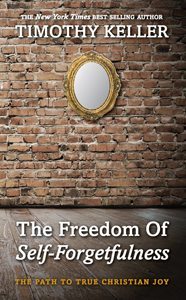The book is small enough to read over your lunch hour but will need to be digested over a lifetime. Keller walks uses 1 Corinthians as lenses to understanding how the gospel had gripped and transformed the Apostle Paul. The result: gospel humility. Or, in other words: self-forgetfulness.
The book is more like a sermon that gets after you. With probing application that pulls the gospel-train into town, Keller helps show pride and chase it away with gospel.
Take for example the area of hurt feelings and ego. Keller writes:
People sometimes say their feelings are hurt. But our feelings can’t be hurt! It is the ego that hurts – my sense of self, my identity. Our feelings are fine! It is my ego that hurts…Walking around does not hurt my toes unless there is already something wrong with them. My ego would not hurt unless there was something terribly wrong with it. Think about it. It is very hard to get through a whole day without feeling snubbed or ignored or feeling stupid or getting down on ourselves. That is because there is something wrong with my ego. There is something wrong with my identity. There is something wrong with my sense of self. It is never happy. It is always drawing attention to itself.
The answer is gospel humility:
If we were to meet a truly humble person, Lewis says, we would never come away from meeting them thinking they were humble. They would not be always telling us they were a nobody (because a person who keeps saying they are a nobody is actually a self-obsessed person). The thing we would remember from meeting a truly gospel-humble person is how much they seemed to be totally interested in us. Because the essence of gospel-humility is not thinking more of myself or thinking less of myself, it is thinking of myself less.
Gospel-humility is not needing to think about myself. Not needing to connect things with myself. It is an end to thoughts such as, ‘I’m in this room with these people, does that make me look good? Do I want to be here?’ True gospel-humility means I stop connecting every experience, every conversation, with myself. In fact, I stop thinking about myself. The freedom of self-forgetfulness. The blessed rest that only self-forgetfulness brings.
This is demonstrated by the Apostle Paul:
Paul is saying something astounding. ‘I don’t care what you think and I don’t care what I think.’ He is bringing us into new territory that we know nothing about. His ego is not puffed up, it is filled up. He is talking about humility – although I hate using the word ‘humility’ because this is nothing like our idea of humility. Paul is saying that he has reached a place where his ego draws no more attention to itself than any other part of his body. He has reached the place where he is not thinking about himself anymore. When he does something wrong or something good, he does not connect it to himself any more.
I love this little book(let). Scarcely are you able to find so much gospel flavor packed so neatly and accessibly.
Pick it up at Westminster Books or Amazon | Kindle ($0.99!)
